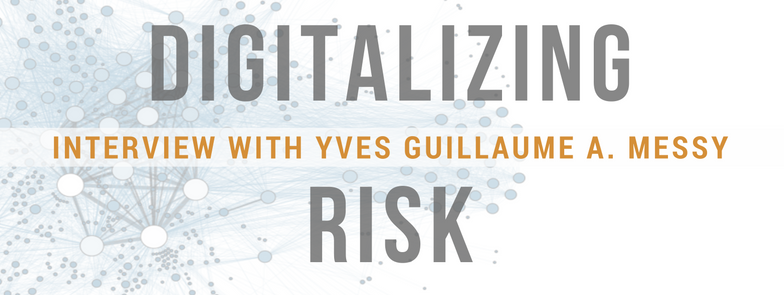Action, reaction.
Over the course of the last year, international political events like Brexit and the US Elections have had tremendous repercussions on the stability of the global economy. As these political events continue to increase in scale, volatility, and frequency, so do their effects on market behavior.
Yves Guillaume Messy, self-taught fintech genius, has set out to close the gap between geopolitical action and market reaction. By leveraging artificial intelligence (AI) and virtual reality (VR), Yves Guillaume is aiming provide business leaders with high-quality information on their political risk exposure at any given time. Simply put, Messy is taking the ‘risk’ out of ‘political risk’ by providing business leaders with first-class tailored information about how their businesses may be affected by a given international event, and what they should do about it. In fact, he’s designed a pre-emptive, pre-risk solution for international investors in the form of an exciting startup called ‘QGS Technologies’.
In the following interview, Yves Guillaume Messy walks us through the evolution of his revolutionary startup, and guides us into the world of data, robots, and virtual reality.
Charlotte Provost: Can you tell our readers more about yourself, and what inspired you to launch your startup?
Yves Guillaume Messy: I studied Political Science intensively at the University of Toronto. As a political science specialist, I grew to recognize the difference between what political analysts see and what financial analysts see, and how that difference is becoming increasingly visible and market relevant. I first studied that gap as an academic, then as an investment analyst, and now as a Fintech and InsurTech founder.
C: You mention ‘fintech’ (financial technology). You are currently specializing in fintech and robo-advisory technologies. Can you tell us what fintech and rob-advisory technology are?
YG Guillaume: Financial services are established on several key aspects: corporate finance, risk management, compliance, investor relations, etcetera. Fintech automates these individual blocks of the financial industry. For instance, compliance can now be automated by technologies called ‘RegTech’, and risk management by robotic or predictive technologies.
C: What fintech ‘block’ are you focusing on?
YG: I focus on risk management. I decided to automate the process of identifying political and regulatory risks to assets. That means that, with the help of technology, I can create early identifiers and potentially predictive solutions that would help firms keep tabs on what their regulatory exposure is, and what their political and geopolitical risk exposure is at any given time.
C: What role do robo-advisory programs play in fintech?
YG: A lot of the failures in market reactions to recent political events have had to do with individual human error and biases, either because of panic, of misinformation, and sometimes even because of lack of sleep! Robo-advisory technology attempts to formalize the detection of categories of risk relevant to investments, in an automatic way. That means that the fixed amount of information you usually buy from major information providers can be processed faster, and in a way that could enhance what human analysts are able to detect when it comes to their portfolio’s risk exposure, even within the complex nature of today’s financial markets.
C: I have to ask out of curiosity. I visited your star-up’s website ‘QGS’, and it mentioned a robot.
YG: Yes, Geoff.
C: Is Geoff one of these robo-advisory prototypes you are currently developing to synthesize all of this information?
YG: Yes. Essentially, Geoff is able to personalize the flow of data and detect relevant political events pre-emptively. Increasingly, he will be able to provide complex political and regulatory risk insights to individual portfolio managers, without the necessity of human intervention. Our virtual reality platform is supercharging the amount of real-time insight and due-diligence investors can do worldwide, and now, without ever leaving their desk.
C: Is Geoff active as we speak?
YG: Yes, in the form of a chatbot, API (application program interface), and as a stream of real-time data that investors can now see on our virtual reality platform called ‘QGS View’. He is now also equipped with natural language implementations, meaning you can ask him questions. Increasingly he will have a personality, almost like ‘Siri’, that you can interrogate and chat with in a VR setting. He will thus be able to chat with you in realtime, giving advice on where one’s business needs to be, and what business leaders should pay attention to in regards to political, geopolitical, and regulatory risk.
C: Essentially, businesses that would be interested in receiving information and advice would do so in a VR setting, rather than through a paper-printed report like in the past.
YG: Exactly. Instead of the standard 1980s template of getting a package of reports to sift through, Geoff would tell you what matters, where to look, and sometimes virtually show you where you need to be anywhere on the planet. The information, along with the data relevant to your portfolio, would thus be transmitted directly to businesses through VR technology.
C: The last time we spoke, you mentioned that ‘Eurasia Group’ is one of the few major organizations which specifically offers political risk assessment services. Are you creating a whole new class of risk management, or are you part of a growing trend?
YG: In a way I’m creating the trend. The nearest competitor we have is mainly concerned with providing data, which is not necessarily what we are focusing on. Certain firms want to provide regulatory information or attempt to predict adverse political events. But what we want to do is provide a realtime robot interface that could potentially replace the need for a whole class of advisors altogether, or to make the best advisors own their field instead.
C: The startup you’re working on is called ‘QGS Technologies’, which is attempting, as you mentioned previously, to manage the way markets react to major international political events. Do you believe the importance of political risk is overlooked in the global marketplace?
YG: A year ago, I would have said yes: political risk is underrated, and it’s something that people in the market should be aware of. But I think that every trader today has had some kind of Brexit-related loss (or gain). The fact that Brexit, and that the US elections for example, persistently eat into market expectations is only the beginning. The problem we have today is that the market is not reasonable in its expectations when it comes to political events. If these algorithms can help rationalize markets’ expectations of political events, we will go a long way towards reducing event-related volatility in global markets.
C: Let’s say Geoff and these other technologies you are currently developing were fully functional during the Brexit crisis. What would Geoff have done differently? How would Geoff have changed the way investors reacted to the event?
YG: Here’s how it would have worked. In January, you, an investor for example, would have received a message that you should pay attention to the fact that a date was set in the UK for an important vote. In February, you would be informed that markets started to react to that future date, and that you should be aware of the increasing social media activity surrounding that topic. In March, you would have received a comprehensive assessment of what the standing odds are for the election. The week prior, you would have had Brexit as the front page item on your political risk briefing, and Geoff would walk you through everything you should know to adequately prepare for the voting results. Additionally, you would receive several personalized VR consultations by British political affairs experts on how Brexit would affect your business specifically. Finally, on the day of Brexit, you would be hearing about an event you have been preparing for months, and have a solid strategy on how to react to Brexit, and what steps to take next.
C: Since this is a form of data-mining, you need an incredible amount of information to provide such detailed accounts of political events. What types, and how many sources of data are you trying to tap into in order to feed your technologies?
YG: One aspect I would like to stress here is that the amount of information that we (the world) have created over the past 10 years is more than any since the beginning of human time. The amount of information we are dealing with is getting exponentially larger. Right now, with our prototype, we are able to master two or three main sources: newspapers, social media platforms, and public government documents. We are looking to scale sources of information to 80,000 sources, drawing from international newspapers, social media in any language, and a bunch of secret stuff [laughs] – in plain sight. With the amount of information these data sets give, you can develop sophisticated abilities to hone in individual events that are pressing to each investor. By leveraging the current technologies available, it costs almost nothing to have the whole newspaper tailored to what you care about, and nothing else.
C: Did you develop this technology yourself?
YG: I built the neural network that amounts to a human brain. I specifically structured it to support political concept, thinking, and reasoning, and then delegated staff on specific layers of this program to make it an increasingly predictive and reliable technology. It’s getting smarter by the month.
C: Do you have any clients using your technology now? Has there been a lot of buzz surrounding your startup?
YG: Personally, I thought this was just a hobby of sorts. I started doing market validation, and spoke to people who might be interested in what I was working on: investment managers, risk managers and staff, individual mid-level officers, etc. We have had amazing feedback so far. The only negative feedback we’ve had is that we need to work harder to connect clients to specific types of investment access – this advice was from a trader at JP Morgan. There are staff from major government agencies, and in export development, who have expressed their desire for us to deploy these types of solutions to secure their country’s businesses abroad. Journalists have also mentioned that they would love to use this technology in order to pre-identify issues that would resonate with their audiences. And, of course, members of the aerospace and defense industries have expressed their interest because this technology could be a useful tool for global security infrastructure.
C: Millennials like yourself are no doubt driving innovation in the global marketplace. What role do you believe that millennials, like ourselves, can play in the future of the marketplace? What advice would you give to students interested in pursuing a career in business, innovation, and global affairs?
YG: They should definitely be digitally literate. They should try as hard as they can to be comfortable with code, because knowing how to code is now the equivalent of knowing how to read 300 years ago – if you can read, you can be part of a revolution. You can be part of a revolution which will affect every side of society from business, security, to entertainment. More than that, you should probably be automating your parents’ job. The average millennial today will not have 7 to 12 jobs like their parents did, they are looking at 30 to 40. So it is vital for us to be adaptive, to learn the relevant languages, and to see what you are passionate about today in regards to pre-2016 jobs, and try to picture what it will look like in a world that is and continues to be disruptive.
C: Where do you see yourself in 5 years? Are you committed to your current startup?
YG: I just mentioned disruption – I have no idea [laughs]. But I am committed to my idea, because there are two risks that I am keen on addressing: climate risk, and risk related to the closing of international trade, the end of globalization, or ‘deglobalization’. Anything that can help us mitigate the effects of these trends, I’m on it.
C: Any concluding remarks?
YG: Learn to code.
 I would like to personally thank Yves Guillaume A. Messy (left) for taking the time to share his thoughts and insights with the NATO Association of Canada (and letting me test out his VR technology). If you are interested in Yves Guillaume Messy’s startup ‘QGS Technologies’, please visit: http://www.qgs.io for more information.
I would like to personally thank Yves Guillaume A. Messy (left) for taking the time to share his thoughts and insights with the NATO Association of Canada (and letting me test out his VR technology). If you are interested in Yves Guillaume Messy’s startup ‘QGS Technologies’, please visit: http://www.qgs.io for more information.
Photo: Yves Guillaume Messy, via LinkedIn
Disclaimer: Any views or opinions expressed in articles are solely those of the authors and do not necessarily represent the views of the NATO Association of Canada.




